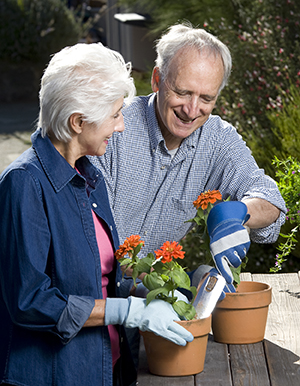For Caregivers: Daily Care for People with Dementia
Over time, people with dementia will need more and more help with daily tasks. These include eating meals, taking medicines, and getting enough exercise. They also include personal care needs, such as bathing and dressing. To reduce stress, make these activities part of a routine. Ask family and friends to lend a hand. And be aware that your loved one’s abilities can change from day to day. If you have problems meeting your loved one’s needs, it’s time to get help. Talk with a social worker or local support agency—such as a local Alzheimer’s Association chapter.
 |
| Gardening can be a pleasant way to keep your loved one active. |
Activity and exercise
Regular activity is good for your loved one’s body and mind. It may even help slow the progression of the disease. Keep to your loved one’s old routines when possible. It also helps to:
-
Do things together. Go for a walk, garden, or bake a cake. Basic, repetitive activities are good choices.
-
Be active as often as possible. This releases pent-up energy, which can reduce restlessness and improve sleep.
-
Include social activities. Take your loved one to see friends and family. But try to keep things simple. Loud noises, crowds, or too many people talking at once can be upsetting.
Taking medicines
Be sure all prescribed medicines are taken as directed. These tips can help:
-
Supervise your loved one if they can't safely take medicines alone.
-
Set a routine so medicines are taken at the same time each day.
-
Ensure that all medicines are taken. A pillbox can help you keep track.
-
Plan ahead. Refill prescriptions before they run out.
Eating meals
At mealtime, serve healthy foods with plenty of fluids. These tips can also help:
-
Keep meals simple. Too many choices can be overwhelming. Try to maintain a calm, quiet atmosphere while you eat.
-
Place healthy snacks, such as fresh fruit, out where they can be seen.
-
Watch eating habits. People with dementia may eat too little or too much. Talk with the healthcare provider if you have concerns.
-
Try finger foods if regular meals become too difficult for your loved one to eat.
Dressing
People with dementia may have trouble choosing what to wear. It’s OK if clothes don’t always match. But if help is needed:
-
Choose clothing that is easy to put on and take off. Use shoes or slippers that fasten with a hook and loop.
-
Lay out a fresh outfit each day. Place clothes in the order they should be put on.
-
If more help is needed, hand over clothing items one at a time. Explain how each item should be put on.
-
Put dirty clothes away so they’re not worn again.
Bathing and grooming
Getting your loved one to bathe can be a real challenge. Try these tips:
-
Treat bathing as a routine activity. But be flexible. A daily bath is probably unrealistic and probably not needed.
-
Prepare bath items ahead of time, and be sure to test the water temperature.
-
Don't leave your loved one alone in the bath or shower.
-
Try visiting a barbershop or beauty salon for help with hair washing, hair styling, and shaving.
Using the toilet
In later stages, people with dementia may have trouble controlling their bladder or bowel (incontinence). To ease problems:
-
Set a routine for using the toilet (for example, every 3 hours) and stick to it.
-
Limit beverages before bedtime to prevent accidents. A bedside commode may also help.
-
Be understanding if accidents happen. Your loved one may be as upset as you.
-
At one point, they may need to wear an adult diaper.
-
Talk with a healthcare provider if incontinence develops suddenly. It may signal other health issues that can be treated.
When to call your healthcare provider
Call the healthcare provider if you notice a sudden change in your loved one’s behavior or emotions. These changes may be due to dementia. But they could also signal other health problems that can be treated.